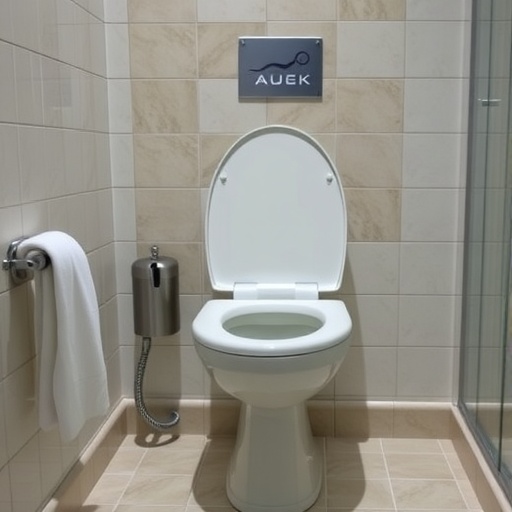Title: The Hidden Dangers of Toilet Time: How Smartphone Use Could Elevate Hemorrhoid Risks
In today’s fast-paced digital world, our smartphones have become indispensable. They accompany us everywhere, transforming mundane moments into opportunities for social media scrolling, news reading, and video watching. However, a compelling new study has illuminated an alarming potential side effect of this digital dependency: increased risk of hemorrhoids linked to smartphone use while on the toilet. Conducted by Chethan Ramprasad and colleagues from Beth Israel Deaconess Medical Center, this study offers a critical look at how smartphone habits during bathroom visits can unwittingly affect our health.
Every year, nearly four million Americans visit doctors due to hemorrhoid-related issues, totaling over $800 million in healthcare expenditures. Hemorrhoids, characterized by the swelling of veins in the anal or rectal area, can cause significant pain and discomfort, leading to a sobering urgency to understand and address their causes. While anecdotal evidence has suggested a connection between smartphone use and this ailment, rigorous scientific studies addressing this link have been sparse. That is until now.
To investigate this connection, Ramprasad and his team surveyed 125 adults who were undergoing screening colonoscopies. Participants were asked to share information about their lifestyle choices, including their toilet habits. Following the survey, the endoscopists conducted evaluations to determine the presence of hemorrhoids. The findings were astounding: 66 percent of participants admitted to using their smartphones while on the toilet, a statistic that points to a broader trend of mobile device usage in various areas of our lives.
Delving deeper, the researchers discovered that individuals who frequently utilized smartphones during toilet time were substantially younger than non-users, hinting at a generational shift in how we engage in private activities. After adjusting for confounding factors like age, exercise routines, and dietary fiber intake, the results indicated that those who used smartphones on the toilet were at a staggering 46 percent increased risk of developing hemorrhoids compared to their non-using counterparts.
A sobering aspect of the findings reveals that smartphone users tend to stay on the toilet significantly longer than non-users. Of the respondents, 37 percent of smartphone users confessed to lingering for more than five minutes, a stark contrast to the mere 7.1 percent of non-users. Engaging in activities like reading the news and interacting on social media contributed to this extended toilet time, thus raising questions about the implications of prolonged sitting.
While it might seem that straining during bowel movements could be the culprit behind hemorrhoid development, the study’s results suggested otherwise. Straining was not shown to correlate with an increased risk of hemorrhoids, contrasting with previous beliefs in the medical community. This revelation underscores the need for a nuanced understanding of how bathroom habits are evolving in the smartphone age.
The researchers posited that this unintended prolonging of toilet time, primarily driven by distraction from smartphone activities, could potentially elevate pressure in the anal region, consequently leading to hemorrhoidal problems. This connection serves as a wake-up call, prompting a reevaluation of our daily rituals and their unforeseen consequences on health.
Co-author Trisha Pasricha emphasized the importance of raising awareness regarding this issue. She highlighted the correlation, noting that the act of using a smartphone while on the toilet might significantly increase the likelihood of experiencing hemorrhoids. As we delve deeper into lifestyle patterns and their health impacts, understanding the intricacies of smartphone use is becoming increasingly critical.
Pasricha further advocated that general recommendations may need to shift—urging people to consider limiting smartphone use in the bathroom and encouraging them to make bowel movements quick and efficient. Inviting individuals to reflect on their bathroom habits could shine a light on a larger conversation surrounding our health and our increasingly sedentary lifestyles.
In an age where attention is often diverted by screens, it’s easy to lose track of time. The fluidity between digital engagement and physical well-being requires a careful assessment. While browsing through social media or reading articles might seem harmless, such distractions could ultimately have lasting negative effects on our health—not just with hemorrhoids but potentially beyond.
This pivotal study adds a new layer of insight that could impact how clinicians advise their patients about bathroom habits in the era of svelte smartphones. As future research expands on these findings, it will be critical to understand if interventions that limit prolonged smartphone use while attending to bodily needs could lead to improved health outcomes.
As digital users navigate daily routines engaged with their phones, the subtle message is clear: maintaining awareness of the unexpected health ramifications of our modern conveniences is essential. While smartphones serve as tools for enhancing our lives, their omnipresence demands a degree of mindfulness, particularly when it comes to personal health.
As this research propels further inquiry into the effects of modern digital engagement on our health, it underscores the significance of fostering mindful habits. The idea of leaving our smartphones outside the bathroom may seem trivial, but such small changes could lead to significant positive health impacts.
Indeed, as we continue to delve into the evolving relationship between technology and health, this study opens the door to further exploration of how our daily habits, influenced by our devices, play an integral role in our overall well-being.
Subject of Research: People
Article Title: Smartphone use on the toilet and the risk of hemorrhoids
News Publication Date: 3-Sep-2025
Web References: PLOS One Article
References: Ramprasad C, Wu C, Chang J, Rangan V, Iturrino J, Ballou S, et al. (2025) Smartphone use on the toilet and the risk of hemorrhoids. PLoS One 20(9): e0329983.
Image Credits: Credit: Ramprasad et al., 2025, PLOS One, CC-BY 4.0
Keywords
Smartphone use, toilet habits, hemorrhoids, health risks, digital distractions, observational study, contemporary lifestyle.




